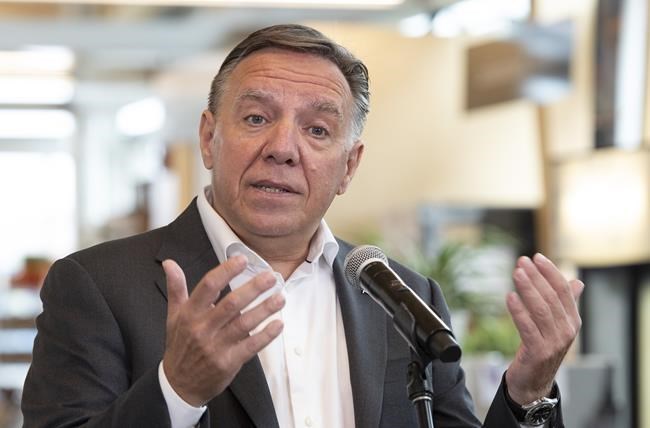MONTREAL — Quebec opposition parties say the provincial government's refusal to hold a debate in the legislature on its plan to impose a vaccine passport system reflects a larger problem with its use of emergency powers.
On Thursday, Quebec Premier François Legault said a debate isn't needed on his government's decision to require Quebecers to show proof of vaccination before they enter businesses such as bars and restaurants. The health order is to begin across the province on Sept. 1.
The three main opposition parties agree a vaccine passport system is needed to prevent COVID-19 transmission, he said, adding that opening up a debate or committee hearings on the issue would expose Quebecers to dangerous ideas.Â
"I don’t want certain people — whom I won’t name — to come explain that there’s a conspiracy, (that) it’s not good to be vaccinated, that in the end, we’re putting a microchip in people’s arms to follow what they’re doing, stories like that," Legault said in Saguenay, Que., north of Quebec City.
"I don’t think we need that in Quebec.”
Two opposition parties, Québec solidaire and the Parti Québécois, say they support the idea of a vaccine passport but want to make sure the health order is temporary and fair.
"This is not a banal measure that we want to put in place and will deprive a certain number of our fellow citizens of the rights to which we are accustomed," PQ health critic Joël Arseneau said in an interview Thursday. "This is why we believe that we must analyze all the ins and outs of a measure like this one to ensure that it is used in the fairest and most equitable way."
The PQ, Arseneau said, wants to know when the passport system would end.Â
Committee hearings, he added, would have the opposite effect of encouraging conspiracy theories. They would hear from health experts who would challenge false and misleading information about vaccines and from ethicists who could explain the potential risks of a vaccine passport system.
Québec solidaire spokesman Gabriel Nadeau-Dubois said the government has the final say about who gets to testify at committee hearings.
"We want to hear from scientists and experts," he said in a news release. "Is that what scares (Legault)? In the middle of a pandemic, it's dangerous for the premier to engage in demagogy with health measures."
Arseneau said the Quebec government has a bad habit of ruling by decree and it's time for it to give up emergency powers.Â
Quebec's Official Opposition said it also supports a debate on the vaccine passport.Â
"While we are in favour of swiftly implementing a vaccine passport to avoid further worsening the situation, we can also debate the modalities without hindering its implementation," Â Liberal health critic Marie Montpetit said in an emailed statement.Â
"It is the role of the Members of the National Assembly to hold these debates and we are available to do so immediately. François Legault must cease refusing such debates because he dislikes hearing opinions other than his own."
On Wednesday, the Quebec government renewed an emergency declaration under Quebec’s Public Health Act. That declaration — which must be renewed every 10 days — gives the government broad powers, including the ability to close places of assembly, limit travel, enter into contracts and "order any other measure necessary to protect the health of the population."
Legault said Thursday his government needs to maintain the state of emergency to impose more health orders.Â
The population agrees with him on the vaccine passport system, he said, because 85 per cent of residents over 12 have received at least one dose of COVID-19 vaccine.
Nadeau-Dubois said the government is using emergency powers to avoid СŔ¶ĘÓƵ held accountable.
"For the past 18 months, François Legault has been governing by decree and refusing to collaborate with the opposition," he said. "Today, he is pushing the envelope to the point of preventing the elected representatives of the Quebec people from debating a measure as sweeping as a vaccine passport."
Conservative party Leader Éric Duhaime, whose party gained its first member of the legislature when Claire Samson joined him in June after she was ejected from Legault's Coalition Avenir Québec, told reporters in Quebec City he has received two doses of vaccine but doesn't support the passport system.
Duhaime said he has received more than 130,000 digital signatures on an online anti-passport petition that was posted on his website.
"Mr. Legault suggests people who oppose his ideas are people who have unfounded arguments … then if Mr. Legault has well-founded arguments we would like to hear them," Duhaime said.
"I would like him, for instance, to table studies that indicate vaccine passports will reduce COVID-19 cases."
Meanwhile, Quebec reported 369 new cases of COVID-19 Thursday and 14 more hospitalizations, to 81. Twenty-eight people were in intensive care, an increase of six. There were no new deaths reported.
Dr. David Kaiser with Montreal public health described the rise in hospitalizations in the city as a "worrisome sign" and said more teenagers need to be vaccinated before school resumes. COVID-19-related hospitalizations in the Montreal region rose by nine on Thursday, to 62.
Quebec is not requiring masks to be worn in classrooms when schools reopen but Kaiser said that decision may need to be revisited if the situation worsens.Â
This report by The Canadian Press was first published Aug. 12, 2021.
—â¶Ä”â¶Ä”
This story was produced with the financial assistance of the Facebook and Canadian Press News Fellowship.
Jacob Serebrin, The Canadian Press

